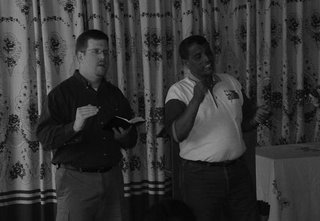 I had a discussion today with a pastor friend who had a question about forgiveness.
I had a discussion today with a pastor friend who had a question about forgiveness.He had spoken to a Christian counselor about the topic of forgiveness. My friend is having to deal with former church members who have voiced a desire to reconcile.
"Saying, 'I'm sorry' is unBiblical," he said. I didn't know where he was going with this so I just listened. He went on to explain that saying that you are "sorry" is simply stating how you feel. "There is no forgiveness in simply stating facts," He said. " Something else is needed."
The evangelical Christian counselor went on to explain that confession of the wrong, asking for forgiveness and offering some sign of sincerity is the Biblical way to forgiveness.
Now, I must admit that I have had very little use for Christian counselors, but this guy is on to something that we as protestants have lost. Penance - the sign of sincerity. (Penance - a sacrament that includes contrition, confession, acceptance of punishment and absolution)
The protestant world sees "repentance" as necessary for forgiveness, and generally it is viewed among fundamentalists as an event that proceeds salvation. Some of the better protestant teachers make clear that repentance is a lifestyle of turning from sin and toward God (ie. changing your mind about sin and agreeing with God that it is bad). But, there is little to no mention of penance in the protestant circles.
Penance is often viewed by evangelicals as a means of "paying" for sin. This idea is rejected on good grounds as there simply is no way that we could "pay" for our sins. But, in the rejection of this extreme we have lost the Biblical role of confession in forgiveness. Just saying "I'm sorry" does not cut it, no matter how sincere you are.
A woman is caught in sin. She confesses her sins and asks for forgiveness. When Jesus offered forgiveness to the adulterous woman He gave her the penance of "...Go and sin no more." Always the call and command of Christ involves real and concrete actions. "Come, take up your cross and follow me."
As an example -- a young man goes to his elder and confesses his viewing of pornography on the internet. The elder brother prays for and comforts the young brother with the words of God. Then the elder brother prescribes the penance of putting a filter on the young brother's computer (or cutting off the internet altogether) in order to gage sincerity, but more importantly to help prevent the young man from repeating the same sin. Far from an "accountability partner" the young man has submitted to the authority of an elder and received an action to "prove" his repentance and aid the young man in sanctification. The young man now has the opportunity to walk in repentance and obey the command he has been given.
Listing my sins to God in some secret prayer and asking Him to forgive me is a cheap way of grace. Changing my mind about sin and telling God He is right is a nice idea that I suppose He appreciates. Paying for a candy bar I stole as a child makes me feel better.
However, actually confessing to someone who has authority over us, receiving God's word on the matter, performing in our bodies deeds of contrition and ceasing from the sins that plague us produce the grace of God in us in our quest for sanctification and the working out of our salvation. Confession, humility, action and obedience follow the disciples of Christ.
The Return of the prodigal Son by Rembrant van Rijn (Art.com)






.jpg)